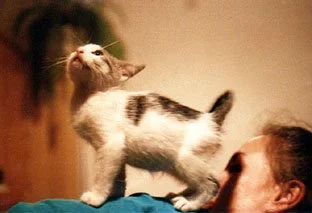Feral or domestic? - That is the question
What are feral cats?
Two feral cats
They are the offspring of lost or abandoned domestic cats living wild, often in colonies; because they have not been handled they are wary of people. Domestic and feral cats are the same species of cat, and it follows that domestic cats can have either domestic or feral kittens, depending on their lifestyle. A single lost or abandoned domestic cat that gives birth to feral kittens is practically always the start of a feral cat colony.
Can feral cats have domestic offspring?
Paradoxically, the answer is yes. If the kittens of a feral cat are raised in a domestic household like Snowball, pictured below, they will be no different from domestic kittens born to a domestic mother because they will be used to humans and their activities, as well as to being handled. This applies to hand-reared kittens as well as to kittens which a feral cat may have brought into a house, and to kittens which are raised in a hospitalisation pen by their feral mother.
Can feral kittens become domesticated?
Kittens of 4-5 weeks of age who have not seen people may spit and struggle at first, but if handled a lot they will soon calm down and enjoy being held. 6- to 7-week-olds will have learned to run away from humans, and will need trapping, confinement in a playpen and intensive handling in order to overcome their fear of people. If let loose in a room immediately they will just continue running away and probably never become completely tame. Kittens over 8 weeks old grow wild fast and need more time for adjustment. Unfortunately, people often do not contact us until kittens have become big and unmanageable. They will then take a long time to tame and will be difficult to home as nervous adults.
Are feral kittens easy to house-train?
Snowball: a feral kitten born in a black refuse sack
Both domestic and feral kittens take naturally to a cat litter-tray, provided it is available in the kitten's living space and is kept clean. Feral kittens have already used earth outside and easily accept cat litter, a similar substance.
Note: cat owners often create problems when they try to force their new cat to use the garden by removing the tray all together, and then complain that the cat has become dirty in the house. A cat will only gradually begin to use the garden as it feels secure outside; until then a litter-tray must be available at all times until the cat no longer chooses to use it.
Can abandoned domestic kittens become feral?
If not rescued fast an abandoned kitten will soon start to use the instincts of survival inherited from the wild cat. It will hide away, live rough and breed. The same applies to adult cats, especially unneutered toms, which often join feral cat colonies and are eventually indistinguishable in their behaviour from their feral cousins. Once caught and brought in they may start purring and disclose their domestic origin. These cats can often be rehabilitated and found homes.
Not all feral cats are truly feral!
A lost or abandoned pet cat forced to fend for itself outside may behave like a feral cat in order to survive. Because of their behaviour they may be indistinguishable from "true" feral cats while outside, but once trapped and brought indoors they often revert to their original tame habits. This process can take minutes, hours, days or even weeks, depending on how long it takes the cat to get over its fear and learn to trust humans again. Once such a cat is confident that it is safe and that humans mean it no harm, it will be friendly and affectionate again.
Can adult feral cats find homes?
When people are asked why they want to adopt a cat the most common answer is that they want an affectionate and cuddly companion. Adult feral cats don't come into this category, or at least not in the short term. Many people are able successfully to coax an adult feral cat into the house, gradually gain its trust and confidence and finally turn it into a loving pet. This is a wonderful achievement and reward for an animal lover who takes a cat in for its own sake. Such a late transformation is only possible because of the cat's innate intelligence and affection.The very thin line between feral and domestic becomes obvious when a domestic cat panics and temporarily "goes wild". Many cat owners have had the embarrassing experience of their otherwise perfectly behaved domestic pet attacking the vet. At the end of the day, all cats are originally wild animals which, thanks to their intelligence and adaptability, have allowed humans to domesticate them.
© Cat Action Trust 1977


